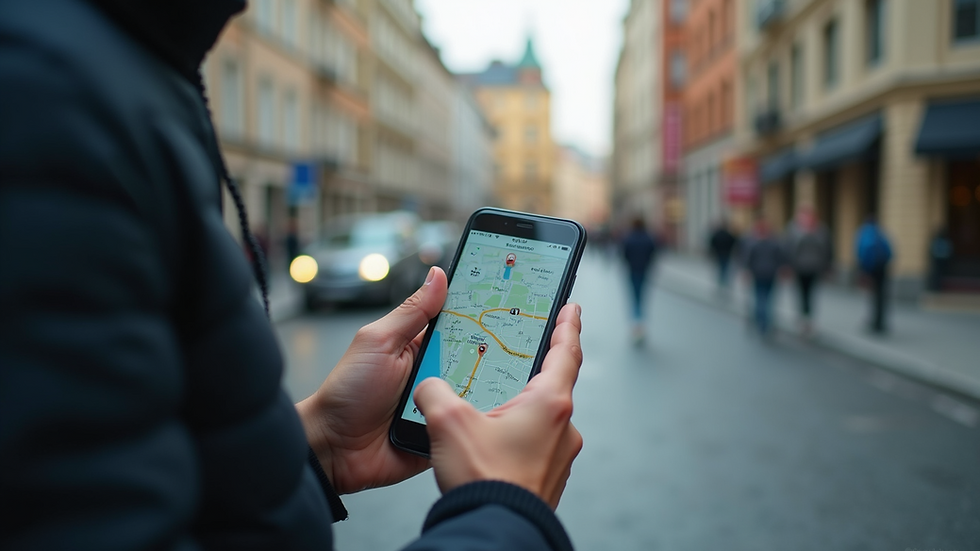Maximizing Business Potential: Geolocation Solutions for IT Projects
- alnazahacompany202
- Jul 27
- 4 min read
In today's fast-paced digital world, businesses are constantly seeking ways to enhance their operations and improve customer experiences. One of the most effective tools at their disposal is geolocation technology. This innovative solution allows companies to harness the power of location data to drive their IT projects forward.
Geolocation solutions can transform how businesses interact with their customers, optimize their operations, and make informed decisions. In this blog post, we will explore the various ways geolocation can maximize business potential, providing practical examples and insights along the way.
Understanding Geolocation Technology
Geolocation technology refers to the use of data to determine the geographic location of a device or user. This technology relies on various data sources, including GPS, Wi-Fi, and cellular networks. By pinpointing a user's location, businesses can tailor their services and marketing efforts to meet specific needs.
Geolocation can be applied in numerous ways, from enhancing customer engagement to streamlining logistics. Understanding how this technology works is the first step toward leveraging its benefits.
Enhancing Customer Engagement
One of the most significant advantages of geolocation technology is its ability to enhance customer engagement. By understanding where customers are located, businesses can deliver personalized experiences that resonate with their audience.
For example, a retail store can send targeted promotions to customers who are nearby. If a customer is within a certain radius of the store, they might receive a notification about a special sale or event. This not only drives foot traffic but also creates a sense of urgency for the customer to visit the store.
Additionally, geolocation can help businesses understand customer behavior. By analyzing location data, companies can identify trends and preferences, allowing them to tailor their offerings accordingly.
Streamlining Operations
Geolocation technology can also streamline operations, making businesses more efficient. For instance, logistics companies can use geolocation to track shipments in real-time. This allows them to provide accurate delivery estimates and improve overall customer satisfaction.
Moreover, businesses can optimize their supply chain management by using geolocation data. By knowing where their products are at all times, companies can reduce delays and improve inventory management. This leads to cost savings and a more efficient operation.
Improving Marketing Strategies
Marketing is another area where geolocation solutions can make a significant impact. By leveraging location data, businesses can create targeted marketing campaigns that reach the right audience at the right time.
For example, a restaurant can use geolocation to target potential customers who are in the vicinity during lunchtime. By sending out special offers or discounts, the restaurant can attract more customers and increase sales.
Furthermore, geolocation can help businesses analyze the effectiveness of their marketing efforts. By tracking customer responses to location-based promotions, companies can refine their strategies and improve their return on investment.
Case Study: Starbucks
A prime example of a company successfully using geolocation technology is Starbucks. The coffee giant has integrated geolocation into its mobile app, allowing customers to find nearby stores and place orders ahead of time.
By using geolocation, Starbucks can send personalized offers to customers based on their location. For instance, if a customer is near a store, they might receive a notification about a limited-time drink. This not only drives sales but also enhances the overall customer experience.
Starbucks has also used geolocation data to analyze customer behavior. By understanding where their customers are coming from, they can make informed decisions about store locations and marketing strategies.
Addressing Privacy Concerns
While geolocation technology offers numerous benefits, it is essential to address privacy concerns. Customers are increasingly aware of how their data is being used, and businesses must be transparent about their practices.
To build trust, companies should clearly communicate how they collect and use location data. Providing customers with options to opt-in or opt-out of location tracking can also help alleviate concerns.
Additionally, businesses should ensure that they comply with relevant regulations regarding data privacy. By prioritizing customer privacy, companies can foster a positive relationship with their audience.
Future Trends in Geolocation Technology
As technology continues to evolve, so too will geolocation solutions. Here are some trends to watch for in the coming years:
Increased Use of Augmented Reality (AR): Businesses may begin to integrate AR with geolocation to create immersive experiences. For example, a retail store could use AR to allow customers to visualize products in their homes before making a purchase.
Enhanced Data Analytics: As more businesses adopt geolocation technology, the demand for advanced data analytics will grow. Companies will need to invest in tools that can analyze location data effectively to gain insights.
Integration with IoT Devices: The Internet of Things (IoT) will play a significant role in the future of geolocation. Smart devices will provide real-time location data, allowing businesses to make more informed decisions.
Practical Steps to Implement Geolocation Solutions
If your business is considering implementing geolocation solutions, here are some practical steps to get started:
Identify Your Goals: Determine what you want to achieve with geolocation technology. Whether it's enhancing customer engagement or streamlining operations, having clear goals will guide your strategy.
Choose the Right Tools: Research and select geolocation tools that align with your business needs. There are various options available, from mobile apps to analytics platforms.
Ensure Data Privacy: Prioritize customer privacy by being transparent about your data collection practices. Implement measures to protect customer information.
Test and Optimize: Once you have implemented geolocation solutions, continuously test and optimize your strategies. Analyze data to understand what works and what doesn't.
Train Your Team: Ensure that your team is well-trained in using geolocation technology. This will help them leverage the tools effectively and maximize their potential.
The Bottom Line
Geolocation solutions offer businesses a powerful way to enhance customer engagement, streamline operations, and improve marketing strategies. By understanding how to leverage this technology, companies can unlock their full potential and stay ahead of the competition.
As you consider implementing geolocation solutions in your IT projects, remember to prioritize customer privacy and continuously optimize your strategies. With the right approach, geolocation can be a game-changer for your business.

In a world where location matters more than ever, embracing geolocation technology can set your business apart. The future is bright for those who harness the power of location data, and the possibilities are endless.



Comments